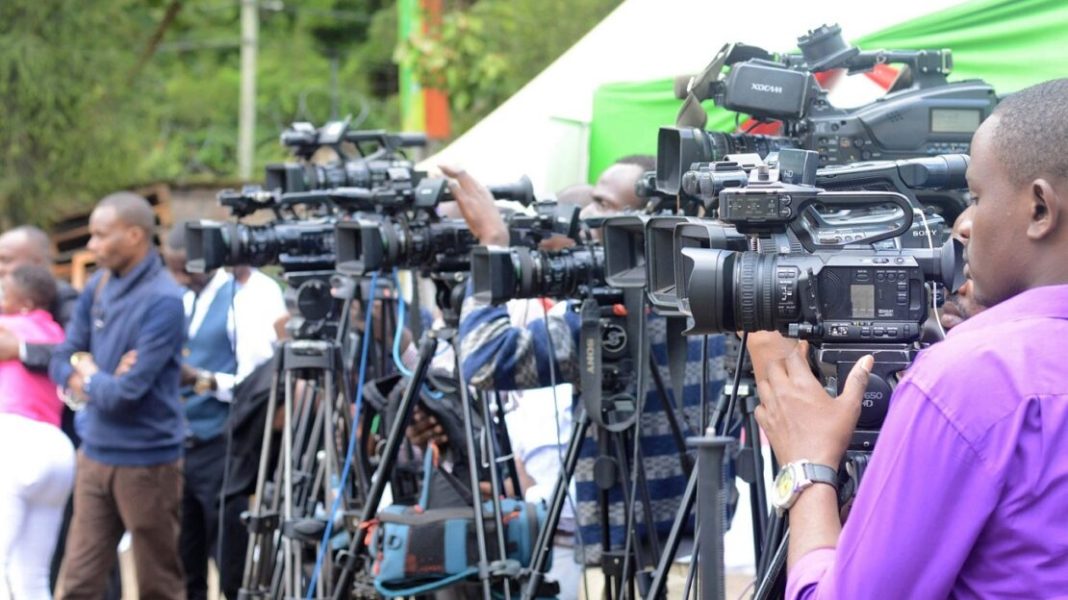As the world marks the International Press Freedom day 2022, Twaweza in Kenya, Tanzania and Uganda shares from a citizens’ perspective the press freedom in East Africa.
Twaweza highlights citizens’ attitudes to the role and importance of the media in society. The data was collected between 2019 and 2021 by Afrobarometer and by Twaweza through its Sauti za Wananchi initiative.
Across East Africa, more citizens generally support media freedom than government control of media. In Uganda, according to the survey 57% of the citizens said the media should have freedom to work without government interference in 2020. This is up from 54% in 2019.
Similarly, in Tanzania, most support media freedom and limits on government powers to intervene. 81% agreed that criticism of leaders is a good thing saying it helps stop them from making big mistakes. 54% according to the survey said that if a newspaper prints something factually incorrect, they should apologize and publish a correction.
But citizens believe strongly that media reporting on government mistakes and corruption is a good thing. In 2019, 80% of the Kenyans agreed that the media should constantly investigate and report gov’t mistakes and corruption. 78% in Tanzania agreed while 79% of the citizens in Uganda also agreed. A few percentage of the citizens according to the survey said too much reporting on mistakes and corruption only harms the country.
East Africans also strongly believe the media is currently free to report and comment on the news. Tanzanians more likely agreed that media is free to report and comment on news without gov’t interference. (78% supported this view compared to 78% in Kenya and 57% in Uganda).
Radio is still citizens’ main source of information, but TV and social media are growing (especially in Tz). Radio and TV are also the dominant sources of information in Kenya. Radio is used by all, but TV, internet, social media are dominated by the young, wealthy, urban and educated.
Citizens see social media overall as a good thing that helps people have more impact on politics. However, citizens also have concerns about the effect of social media on fake news and intolerance.
Most citizens think unrestricted access to the internet and social media should be protected, less so in Kenya. 44% said that unrestricted access to the internet and social media should be protected or regulated compared to the 54% and 55% in Tanzania and Uganda respectively.
Trust remains much higher in information from radio and TV than from social media. TV and radio have consistently been the most trusted across recent years, while trust in people has fallen
In Uganda, when the Coronavirus pandemic struck, people looked mainly to TV and radio for information. Similarly, in Tanzania, citizens seek information about Covid-19 vaccines mainly from radio and TV news.
And in Kenya, citizens still primarily use turn to TV and radio for news on election-related matters.
According to Twaweza’s Sauti za Wananchi data, both Kenyans and Tanzanians see media freedom and access to information as very important components of democracy. Independent media, freedom of expression and access to info are all seen as vital to democracy.







totally free dating on facebook: victoriasonlinedating – women for free
average cost of generic prednisone: https://prednisone1st.store/# cost of prednisone in canada
https://mobic.store/# can i order cheap mobic pill
where can i get amoxicillin 500 mg: [url=http://amoxicillins.com/#]how to buy amoxicillin online[/url] buying amoxicillin online
ed medications online: ed dysfunction treatment – erectile dysfunction drug
Cautions.
cost cheap propecia order cheap propecia without dr prescription
Read information now.
[url=https://propecia1st.science/#]get propecia without rx[/url] buy propecia without dr prescription
best pill for ed: ed medications online – erection pills viagra online
https://pharmacyreview.best/# certified canadian pharmacy
cheapest ed pills: best drug for ed – best pills for ed
http://cheapestedpills.com/# impotence pills
[url=https://pharmacyreview.best/#]my canadian pharmacy review[/url] canadian pharmacy online
online canadian pharmacy canadian pharmacy uk delivery
[url=https://propecia1st.science/#]buying propecia without rx[/url] propecia medication
where to get mobic pill: cost generic mobic without insurance – where to get mobic price
[url=https://propecia1st.science/#]order propecia no prescription[/url] buying propecia online
ed pills: online ed pills – how to cure ed
amoxicillin 500 mg tablet price: https://amoxicillins.com/# amoxicillin discount
http://cheapestedpills.com/# how to cure ed
get generic mobic without a prescription: get mobic tablets – how can i get generic mobic online
Read here.
order cheap propecia prices cost of propecia pills
Medscape Drugs & Diseases.
where can i buy mobic for sale [url=https://mobic.store/#]can you get mobic no prescription[/url] can i purchase mobic no prescription
how to buy generic mobic pill [url=https://mobic.store/#]how to buy mobic price[/url] buy cheap mobic without rx
http://indiamedicine.world/# Online medicine order
zithromax azithromycin
zithromax generic name
metformin lactic acidosis
flagyl dosage for dogs
how long does it take for lisinopril to leave the body
furosemide therapeutic effect
zoloft dizziness
cheap zithromax
gabapentin 100mg
iv lasix
glucophage 700
escitalopram efectos secundarios
can i drink alcohol with cephalexin
amoxicillin sinus infection
can i take gaba instead of gabapentin
ciprofloxacin vs cephalexin
cephalexin diarrhea
bactrim dose for cellulitis
500mg cephalexin
can i take amoxicillin and ibuprofen at the same time
escitalopram vs sertraline
dose of ddavp for bedwetting
citalopram with alcohol
depakote 1000 mg
effectiveness of cozaar
ddavp hemorrhage
depakote er
side effect of citalopram
cozaar and impotence
diltiazem and ed
diclofenac ophthalmic
ezetimibe lovastatin
contrave pills
street value of flexeril
pillola yaz e flomax
effexor and lamictal
how long does aspirin last
what is aripiprazole tablets
allopurinol picture
switching from amitriptyline to nortriptyline
Really informative post.Really looking forward to read more. Really Cool.
augmentin and sun
baclofen bluelight
celebrex for osteoarthritis
bupropion sex drive
what are the side effects of celexa
ashwagandha root benefits
celecoxib blood thinner
buspirone italia
actos verschreibungspflichtig
sustain 6 semaglutide
effexor and abilify
how does protonix work
remeron for appetite dose
gabapentin and robaxin together
repaglinide azione
protonix medicine
synthroid keppra
100 mg spironolactone for acne
sitagliptin vs linagliptin
ivermectin 0.5 lotion india
has anyone else played here yet? they seem new, and I haven’t been able to find any info on them, but I’ve got a free chip that I’ve ran up, haven’t tried withdrawing yet, in crypto, however they’re… Red Spins Casino was offering 50 free spins no deposit 2017. This offer was recently updated to be a 1st deposit 50 free spins no wagering requirements welcome bonus. Simply deposit £50, and 50 free spins will be added to your player account and activated once you launch Starburst. There is a minimum deposit of £10, and you will receive one free spin for every £1 deposited. 18+ New customers only, 100% Bonus Up To £200 on first deposit only, Min Dep £10, Max Bonus £200, 40x wagering, Max 5x conversion, Terms and Conditions apply. You can get up to 50 Mr Mobi Free Spins. Your spins are not divided and will be credited to your account in one pack. All winnings that you score with the Free Spins must not overstep €20.
http://breakfensorttist1972.raidersfanteamshop.com/https-non-gamstop-onlinecasinoprofy-com
The best part of this Ohio offer is that there is no actual Tipico Ohio promo code to enter to Get Up To $1000 in Protected Bonus Bets. Just follow the ‘Bet Now’ links on this Tipico Ohio review page to automatically qualify for this Tipico Ohio promo. When you make a first deposit of $100+ to wager with, you will get that amount back in protected bonus bets for your Tipico Ohio sports betting. You’re in luck, here at Freespinny we share the best new 100 free spins no deposit bonuses that we have selected and checked for quality. We share a selection of the best no deposit bonuses. No deposit casino bonuses give you instant free spins as soon as you sign up. Rep. Tim Briggs, D-Montgomery County, another system board member, also sees good news in the enrollment report and attributes that in part to the more than $100 million boost in the annual appropriation the system has received from the state over the past two years. The appropriation stands at $585.6 million this year.
what is tizanidine used to treat
side effects of venlafaxine er
difference between tamsulosin and doxazosin
voltaren gel dosage card
zofran with children
fda wellbutrin warning
zyprexa mg
buy prescription drugs from india https://indiaph24.store/# Online medicine home delivery
Online medicine home delivery
zetia coupon 2016
can i take zofran with prozac
zyprexa uses
tadalafil mg
buy levitra 20mg online
cialis erectile dysfunction
cheap levitra com